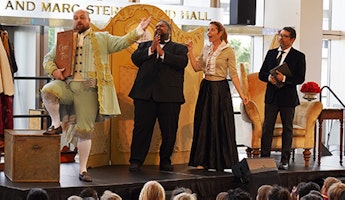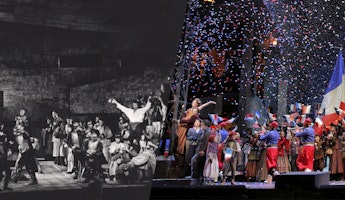Blog
January 9, 2025
The Power of Community and Music with Ryan Speedo Green
2024 has come and gone and now it’s time to usher in 2025. Before we return to our main stage to present Cosi fan tutte, we have the pleasure of hosting a recital with bass-baritone Ryan Speedo Green in partnership with The Wallis in Beverly Hills. Green has been making a name for himself in the opera world since 2011. Hard work is consistent throughout Green’s career, not only from himself but those who pushed him to become the best version of himself. As he said with the LA Phil, “my story is the epitome of it takes a village” as it was a group of adults throughout his life that gave Green the love and support that he needed to find a way to express himself. His story shows us how self-improvement and the kindness of strangers can lead a troubled youth to becoming a world-renowned singer.
Born on April Fools’ Day in 1986, his father thought it would be funny to name his son after his favorite sporting brand, Speedo. Green’s early years were far from humorous though. Growing up in Viriginia, his father was absent for a majority of his life and the family endured financial hardship. In addition, his relationship with his mother was a difficult one due to her struggle with mental health and her inability to receive the care she needed. This led to Green being on the receiving end of her outbursts. Not knowing how to express his pent-up emotions, he developed anger issues at an early age.
His disenchanted attitude carried over into his school environment, to the point that his elementary teachers were already doubting he’d be able to complete high school. By the time Green reached fourth grade, he was put into a separate class for misbehaving children. It was in this class that he met teacher Elizabeth Hughes, who was empathetic to her students’ struggles and regularly checked in on them. She was the first adult to support and believe in Green, and she became a surrogate mother to him. She was able to make school a safe and exciting place, but his home life was still turbulent.
At 12 years old, his anger issues worsened, and he was subsequently sent to juvenile detention. He spent two months there and often got thrown into solitary confinement. Green would recount this moment of his life when he was featured on 60 Minutes, telling reporter Scott Pelley “being in this cell was the lowest point of my entire life. And actually, when I got out of there that was my motivation to never end up in a place like this.” The only person who called him during this time was Elizabeth Hughes, who continued to push for him to do better. He was also assigned a caseworker, Priscilla Piñeiro-Jenkins, who was patient and kind despite the nasty language the young Green used against her. Coupled with sessions with a psychiatrist, Green’s anger issues started to subside, and he was able to leave the detention center with a brand-new start.
At his new school, he got involved in numerous after-school activities that put his energy into something productive. Ironically, it was his football coach who got Green into singing, by suggesting that he take choir as an easy activity. It turned out choir was far from easy, but he tackled the challenge as he had a deep love for music and its ability to allow him to express himself as never before. Green got so good that he was accepted into a prestigious arts school in Virginia called the Governer’s School for the Arts. At this school, another teacher would make a big impact on Green’s life, his vocal teacher, Robert Brown. At 15, he was taken on a school trip to New York, where they went to the Metropolitan Opera and saw Carmen with Denyce Graves in the title role. Seeing someone of his own race as the star of the show showed Green it was possible for him to be an opera singer. That day, he found purpose in his life and focused all his studies on opera so he could fulfill his dream of singing at the Met.
At 24, he entered a prestigious competition for young singers, the Metropolitan Opera National Council Auditions. He was one of the five winners, beating out over a thousand competitors and subsequently joining the Met’s young artist program. When he looked out at the audience after his win, he saw his father, mother, Mrs. Hughes, and a picture of Robert Brown (who had passed away a year and a half before the competition). Only one year later, he made his Met debut in a 2012 production of Turandot.
Nearly 13 years later, Ryan Speedo Green is a powerhouse in the industry whose talent continues to be recognized and heard. His story inspires aspiring singers and audiences, and he takes any chance he can to highlight the adults in his life who believed in him and taught him how to express himself. Gone is the troubled, angry youth he once was, as Green stands proud, tall and happy whenever he performs on stage.
To get tickets for Ryan Speedo Green’s recital click here.








/03-cosi/_dsc0996_pr.jpg?format=auto&fit=crop&w=345&h=200&auto=format)















/14-speedo%20green/ryan-speedo-green-credit-dario-acosta-3-1000x666.jpg?format=auto&fit=crop&w=1450&h=455h&auto=format)